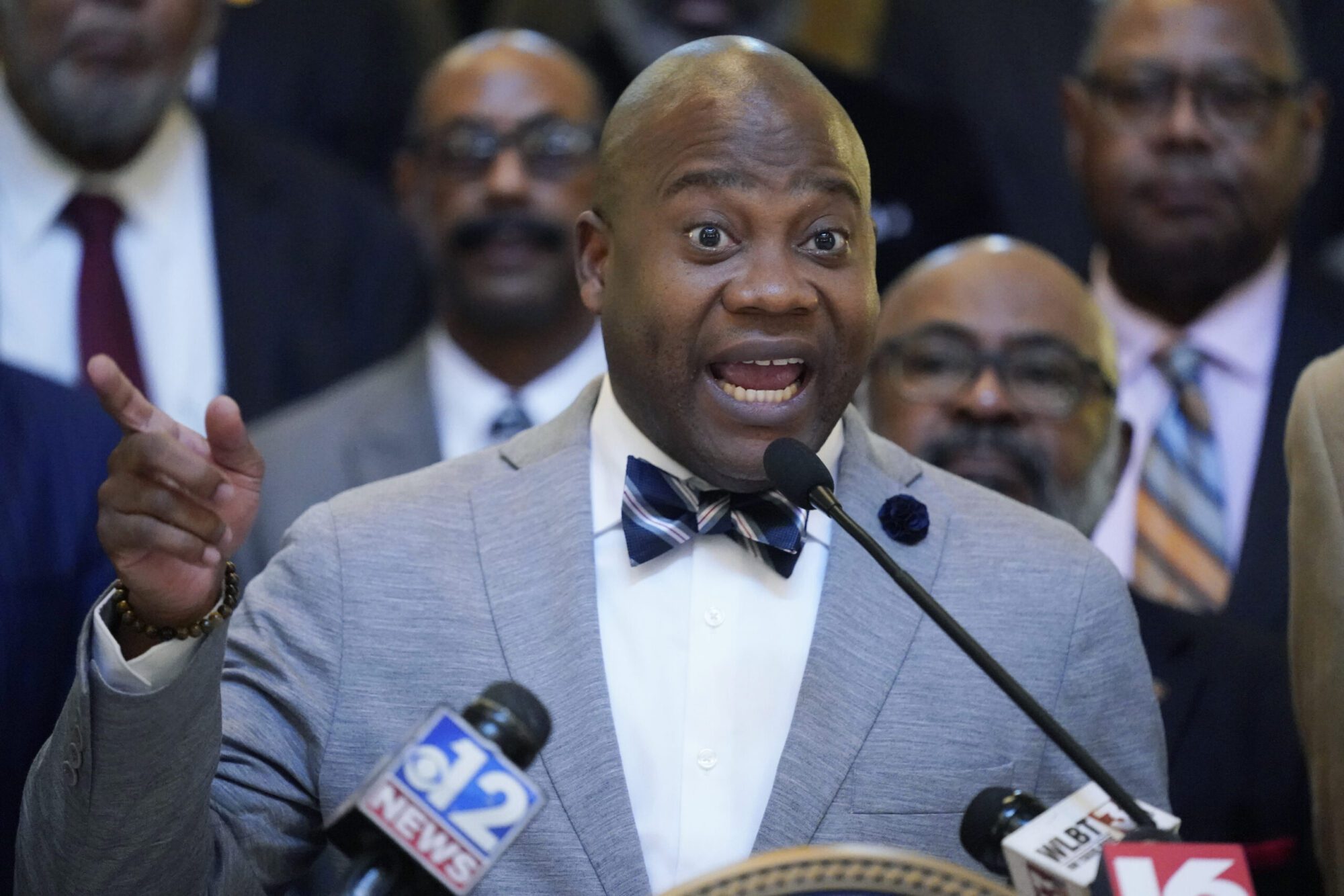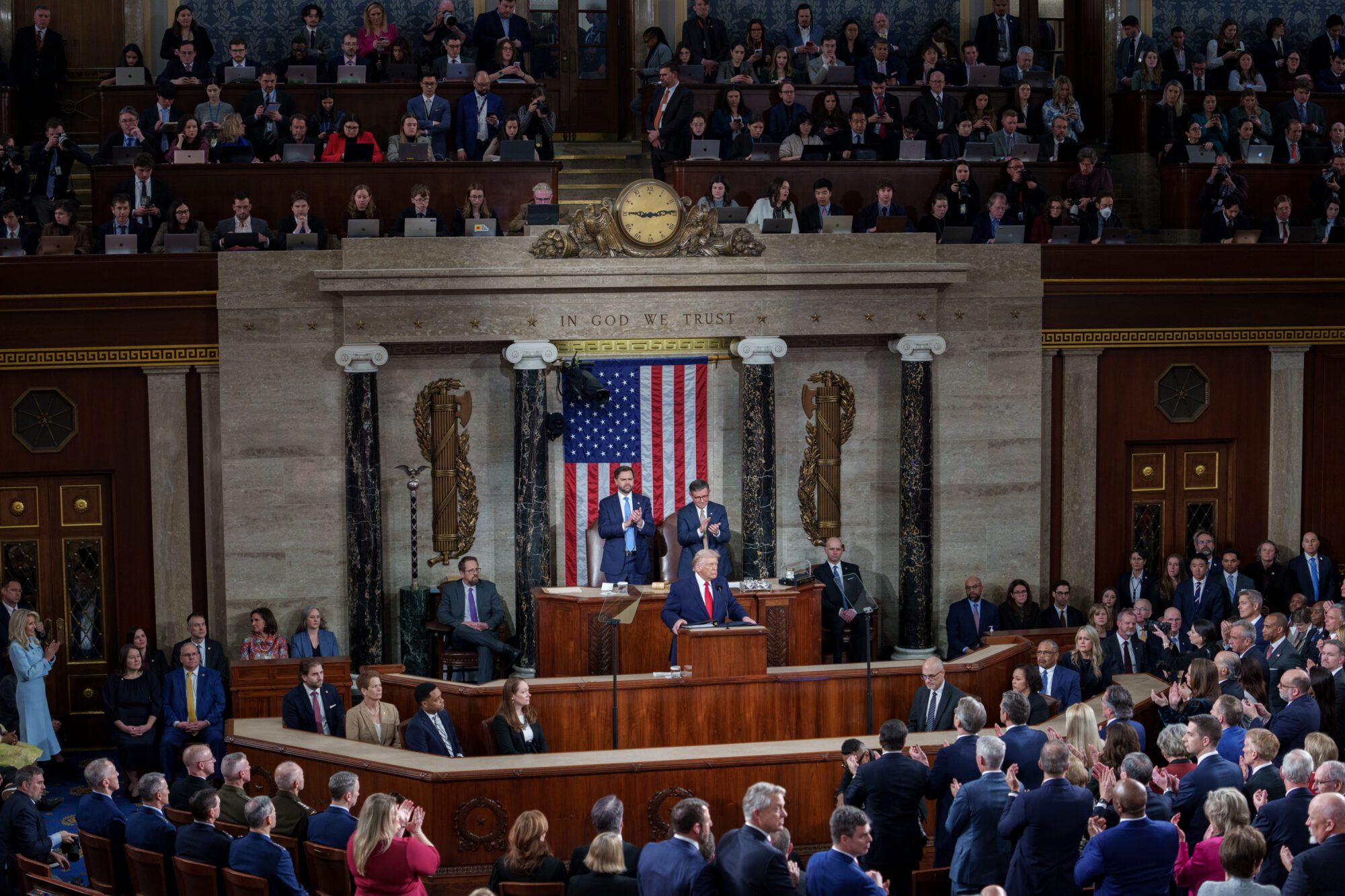
Sen. Derrick Simmons, D-Greenville, and other Democratic legislative leaders, criticize the Republican leadership's inaction on addressing the state's hospital crisis, during a news conference, Thursday, Feb. 2, 2023, at the Mississippi Capitol in Jackson. (AP Photo/Rogelio V. Solis - Copyright 2023 The Associated Press. All rights reserved.)
- Lawmakers passed new legislative districts this session seeking to comply with the federal court’s order, setting up 15 special elections later this year.
Attorneys representing Mississippi and the state NAACP were back before a federal three-judge panel this week to once again review legislative district boundaries.
Lawmakers adopted changes this session intended to comply with the court ordered redistricting, namely in DeSoto and Chickasaw counties as well as in the Hattiesburg-Forrest County area, after the Mississippi NAACP filed a lawsuit challenging the 2022 legislative redistricting plan claiming black voting strength had been diluted.
Under the newly adopted legislative redistricting plan, 15 special elections – 10 in the Senate and 5 in the House – would be held later this year to allow for increased majority-minority districts in the Senate and House, as determined necessary by the court.
READ MORE: Legislative redistricting plans adopted in House, Senate setting up 15 special elections later this year
The following black voting age population (BVAP) adjustments in the 15 affected districts were made by lawmakers this session:
- Senate Districts
- 1 – Up from 24.72% to 51.49%
- 2 – Down from 32.02% to 24.28%
- 10 – Down 32.59% to 28.42%
- 11 – Down 61.23% to 49.87%
- 19 – Down 24.69% to 23.24%
- 34 – Down 55.36% to 52.33%
- 41 – Down 29.39% to 22.97%
- 42 – Down 15.98% to 7.88%
- 44 – Down 22.72% to 14.33%
- 45 – Up 24.78% to 50.02%
- House Districts
- 16 – Down 60.85% to 51.94%
- 22 – Up 29.23% to 50.10%
- 36 – Down 60.2% to 53.78%
- 39 – Down 21.52% to 17.99%
- 41 – Down 66.28% to 63.36%
Compare the 2022 legislative district maps with the 2025 newly adopted maps here
The NAACP now contends that the new maps do not do enough to satisfy their complaint and are asking the court to consider changes in Chickasaw and DeSoto counties. The plaintiffs did not object to the changes made in the Hattiesburg-Forrest County area.
The NAACP claims that the adjustments in DeSoto and Chickasaw counties did not go far enough, saying the electoral opportunities created by the new boundaries with increased black voting age population are “illusory.” It is a similar position taken during debate in the Senate earlier this year.
Prior to the new maps being adopted, Democratic Leader Derrick Simmons offered an amendment that would have kept the changes proposed in the Forrest County area but increased the black voting age population in the newly created DeSoto County district without pairing the two affected senators, Reginald Jackson (D-SD 11) and Michael McClendon (R-SD 1). Simmons’ proposal, which overwhelmingly failed, would have moved McClendon into the new district and left Jackson in his own.
The state’s attorney maintains that the new districts as adopted this session create competitive legislative districts and meet the requirements set forth by the court.
Notably, the DeSoto County Board of Supervisors are also contesting the new districts in their area over “the potential adverse impact” the maps would have on their voters. However, their contention appears to center around an issue raised by Senator McLendon when he questioned the logic of the City of Hernando being split into two Senate districts.
The judicial panel, which consists of U.S. Fifth Circuit Judge Leslie Southwick and U.S. District Judges Sul Ozerden and Daniel Jordan, did not issue a ruling following the latest round of arguments before the court but did indicate that a decision would be forthcoming as quickly as possible.
Time is of the essence, given that the qualifying period for the 15 special legislative elections, as set out by the Legislature, begin May 19. Primary Elections would then be held August 5, with a General Election set for November 4.
The court could redraw the districts, make adjustments or agree to the plan lawmakers adopted.










